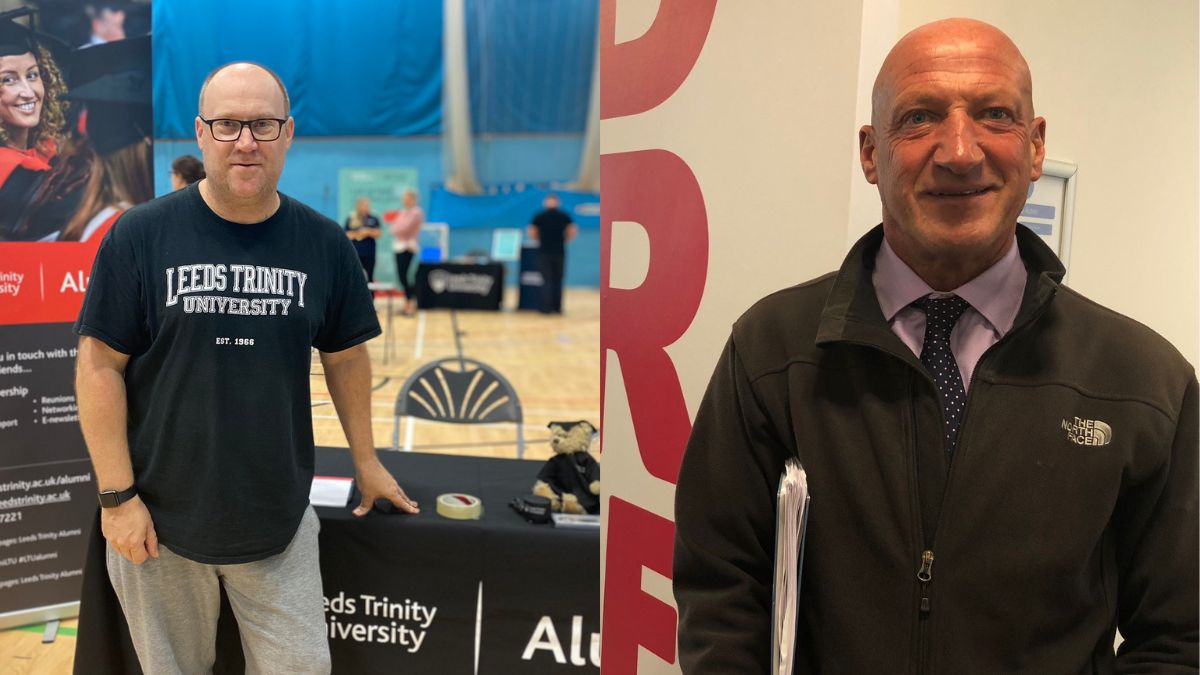
Having worked in alumni relations for 20 years, I have met so many different people working in a diverse range of jobs. I have travelled all over the UK to meet and interview alumni and find out more about their careers.
Usually, it’s just a case of booking travel and possibly a hotel, then organising an interview and a photo shoot. But towards the end of last year, I attended a very different meeting where I wasn’t allowed my phone, camera or even a sheet of paper to make notes on. All I was instructed to take was some photo ID.
On this occasion, I was meeting Phil Cawley (pictured on the right), an Economics graduate from 1979 who, on retiring, joined the police force in a civilian role and now promotes and delivers Restorative Justice for Lancashire Constabulary. We visited a Category B local remand prison in the North West of England and I was able to sit in on a session where Phil spoke to prisoners about the process of restorative justice, where victims of crime have the opportunity to meet their offenders.
I have known Phil for several years. It was through him that I first heard about restorative justice, and I must admit I wasn’t sure how I felt about it. Having been the victim of crime, I asked myself: what would I do if I had the opportunity to sit down with the person who wronged me and threatened my life?
I really didn’t know what to expect and, having spent the months prior to the meeting working while looking after my father who had recently had a heart attack followed by open-heart surgery, I hadn’t had the chance to think about it in detail.
I met Phil for a coffee before we went into the prison, and he gave me a thorough briefing about what to expect and advice on how to best handle myself amongst the prisoners. Entering the prison and walking through countless doors that were immediately locked again felt like something from a film set.
This was my first time in a prison and after a long walk around the facility, we entered the wing where Phil would be speaking to the prisoners, who had applied for a programme of self-development and learning. We met up with Phil’s contact, a female Senior Interventions Practitioner on the recovery wing (from drug and alcohol abuse), who briefed me about the nature of the wing, the schedule and how many people to expect in our session. I noticed straight away the stature and respect she had, a skill that Phil also had in abundance. They knew exactly how to build relationships with everyone they met.
We gathered in the meeting room and Phil spoke to the prisoners about the restorative justice process. He highlighted stories about victims who had gained closure and subsequently been able to move on with their lives after speaking to their perpetrator. Initially, I felt that the process was just for the victims, but the more I heard, the more I realised how valuable the opportunity to apologise was for those who had committed crimes.
After the talk concluded, there was a long queue of people waiting to speak to Phil about the next stage of the process. When I caught up with him a few weeks later, he told me that two of the prisoners had formally signed up to the restorative justice programme. I was very pleased to hear this but not surprised having witnessed how good Phil is at his job and the impact the process can have.
Leeds Trinity offers a number of courses related to restorative justice and we also work with the Unlocked Graduates programme, who have been on campus again for this year’s Summer Institute, to deliver an MSc in Applied Custodial Leadership. I am currently working with Phil and colleagues to explore how his experience could benefit our students in future.
Our alumni make a real difference by guest lecturing, sharing their stories, and providing mentoring and placement opportunities – and learning from individuals like Phil is definitely one of the highlights of my role.
Brett Arnall is the Alumni Relations Officer at Leeds Trinity University.